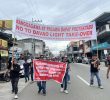DAVAO CITY – A national survey ranked Davao City fourth in terms of “competitiveness” in development. But some sectors said the city’s leaders must look beyond those figures and look at a holistic and “people-oriented” approach to development.
The Cities and Municipalities Competitiveness Index (CMCI) 2014 made by the National Competitiveness Council (NCC) ranked Davao City in fourth place behind Makati, Cagayan de Oro and Naga. The ranking was based on three criteria: economic dynamism, government efficiency and infrastructure.
The index noted Davao City topped in infrastructure as it placed high scores in sub-indexes such as annual investment in infrastructure (1st), education (2nd), public transportation, automated teller machines, accredited tourist accommodations and health infrastructure.
But the city fell in distance to major ports (27th), information communication technology (76th) and availability of basic utilities (107th).
Davao City ranked 11th nationwide in economic dynamism with high scores in jobs generation, financial institutions and productivity, and ranked13th in government efficiency with high scores in transparency, LGU revenues and business registration efficiency.
The survey showed Davao lagging in terms of the number of business and professional organizations, inflation and growth of local economy. It also ranked low in security, health and schools.
Davao City Mayor Rodrigo Duterte said he is happy with the city’s ranking, as he credits his administration’s drive to lead in infrastructure projects.
“If the government takes the lead in building infrastructure, then investments and tourism will come,” he said.
While the city’s figures are generally on the upside, development worker Jay Rosas said the local government can do more to take advantage of Davao’s cohesion among the leaders and various sectors and ethnic groups such as indigenous Lumads and Muslim groups.
“The essence of diversity and social cohesion for me is something that is integral to development. I think Davao is in the best position to take advantage of that, to look beyond economic figures,” he said.
Rosas, who once worked for the Mindanao Economic Development Co (MEDCO), the predecessor of Mindanao Development Authority (MinDA), said the city has to do more than showcasing diversity especially during festivities.
“But it should go beyond recognizing diversity or showcasing our culture during events. They should also learn and use it on present realities,” he said.
He cited the city’s urban planning that lacked studies on the city’s old riverways, resulting to construction of housing subdivisions and commercial lots in riverways of low-lying areas that brought problems to residents and local officials such as flooding during periods of heavy rainfall.
“Better urban planning should have been the result or should be the priority now given that Davao is in the throes of whatever development boom it is experiencing. The land use code and transport system are basic things that should be tackled in planning,” he said.
But for labor leader Ronualdo Basilio, secretary general of from Kilusang Mayo Uno Southern Mindanao, the gauge of the city’s competitiveness must be on its target beneficiaries – the people of Davao.
“Remember that President Aquino has been saying that economic development must have inclusive growth, but where is it now?” Basilio asked.
Basilio said the concept that infrastructure brings development is a limited perspective coming from big businesses, discounting the fact that urban poor communities in the city have been demolished to give way to subdivisions, malls and business establishments.
“The problem with that point is that when you put up buildings, you tear down houses of communities. When you said you create jobs from big businesses, you also displaced communities and their livelihood,” he pointed out.
The labor leader also said the rise in employment due to massive constructions only provided temporary or contractual employment.
“Because after six months to one year, these construction workers would be out looking for new jobs. Workers are more productive when they have secure jobs,” Basilio said.
Aida Sisa, a farmer leader of the Paquibato District Peasant Association, also said in a radio interview that while there are farm-to-market roads constructed in the hinterlands in the city, what is missing is the City’s Agricultural Office to sustain their farms.
“There may be roads, but what is missing is our harvest because of the lack of government support to our farms,” she said.
Public transport leader Edil Gonzaga from Transmision also raised concern on the city’s plan to overhaul the transport system.
“We hope that whatever development our mayor is thinking about, he should remember the needs of the people,” Gonzaga said.(davaotoday.com)
competitive, davao, davao city, Farmer, infrastructure, KMU, Piston, transport, workers







